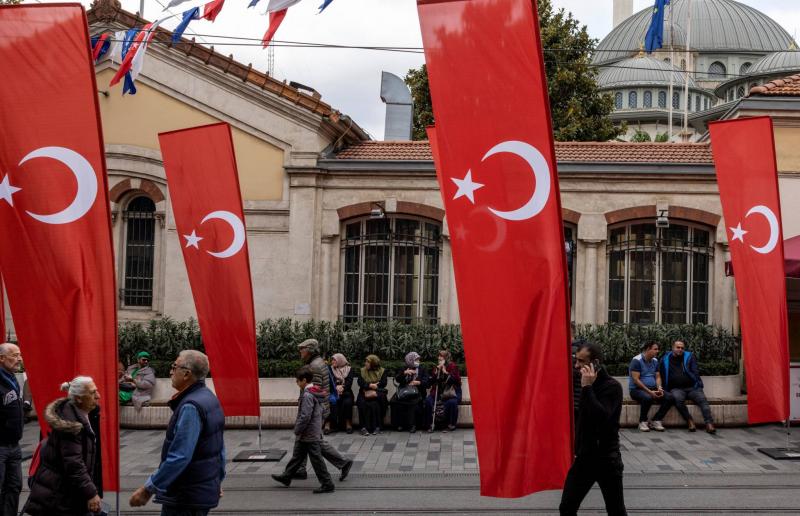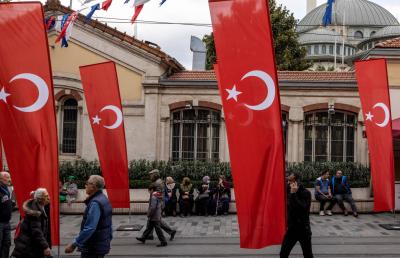Like many Syrians in Turkey, Ghaith Samir anxiously awaits the results of the presidential election runoff next Sunday, feeling fear over the possible election of the opposition candidate who vows to deport migrants back to their homelands as quickly as possible. Samir fled the civil war in Syria in 2012 and is now one of over 3.4 million Syrians living in Turkey, where economic issues have fueled rising anti-migrant sentiment that has extended to the presidential election. Samir, who obtained Turkish citizenship two years ago and plans to vote for President Recep Tayyip Erdoğan on Sunday, said, "The opposition's promises scare and anger me. They frighten me because they cause more hatred from Turkish citizens towards me, my children, and my family."
While Erdoğan has a good chance of winning the runoff after failing to achieve a direct victory in the first round two weeks ago, his competitor Kemal Kılıçdaroğlu has adopted an anti-migrant rhetoric in an attempt to change the course of the election race. Kılıçdaroğlu has collaborated with an extreme-right nationalist party and pledged to repatriate all migrants within a year, with posters of him plastered across Turkish cities promising to deport Syrians. Although Erdoğan has been more welcoming to Syrians and other migrants in Turkey, which has five million refugees—the highest number in the world—he has also taken steps to expedite the return of Syrian migrants to their homeland.
For Syrians, the elections and the anti-migrant shift in Turkish politics have sparked a new uncertainty about their future, leading many to wonder if they will have to start over again after fleeing a bloody war in their homeland. Samir, 38, said that several of his friends and relatives have postponed their future plans until after the elections, to the extent that his brother is waiting for the election results to decide whether to replace the broken “food processor.” He added, “Most Syrians feel like their entire lives are on hold waiting for the election results.” Even though he holds Turkish citizenship, Samir mentioned he has "alternative plans in case something happens."
Samir is considering relocating with his wife and young children to a country that may be more favorable for Syrians, such as Egypt or the Kurdistan region of Iraq.
When Kılıçdaroğlu announced on Wednesday that he had reached an agreement with Ümit Özdağ, the leader of the far-right Victory Party, to support him in the runoff, Özdağ stated that the opposition's promise to deport migrants would lift the “burden” off the economy and prevent Turkey from becoming an “absorption country” for migrants. By relying on anti-foreign rhetoric that accuses Afghan and Syrian refugees of theft, sexual harassment, and other crimes, Özdağ claimed that deporting migrants would make "the streets safe again."
Syrians, in particular, are concerned about this tone and Kılıçdaroğlu's new anti-migrant posters hanging from lamp posts and in underpasses. Ahmad, a 40-year-old Syrian who also holds Turkish citizenship, questioned the impact of these signs on Syrian children who can read Turkish, describing the messages as “the most disgusting words and the most heinous hate speech.”
Most major fighting in Syria has stopped for years, with Turkey controlling pockets along the border where it supports the Syrian opposition in its conflict with President Bashar al-Assad. These areas are already overcrowded with Syrians displaced from other parts of Syria. Living conditions across the border are extremely harsh, with infrastructure destroyed, the economy collapsed, and an ongoing threat of war resuming suddenly. Residents in these opposition-controlled areas fear retaliatory actions if the government regains control.
As their fate has turned into an increasingly significant political issue, most Syrians still feel uneasy even if Erdoğan defeats Kılıçdaroğlu on Sunday, pointing to Erdoğan's government's plans to build new housing projects along the border to expedite their deportation. Like other leaders in the region, Erdoğan is also working on resolving disputes with Assad, increasing the likelihood of a rapprochement that concerns many Syrians in Turkey.
Omar Kadkoy, a Syrian working at the Ankara-based economic research center TEPAV, said that Syrians still face misery and fear of a homeland that their children will see as a foreign land. He commented on the voluntary return to Syria, saying, "It’s not an easy decision," adding that Syrian children in Turkey “have been shaped by everything that is Turkish. Syria for them is a bedtime story."




